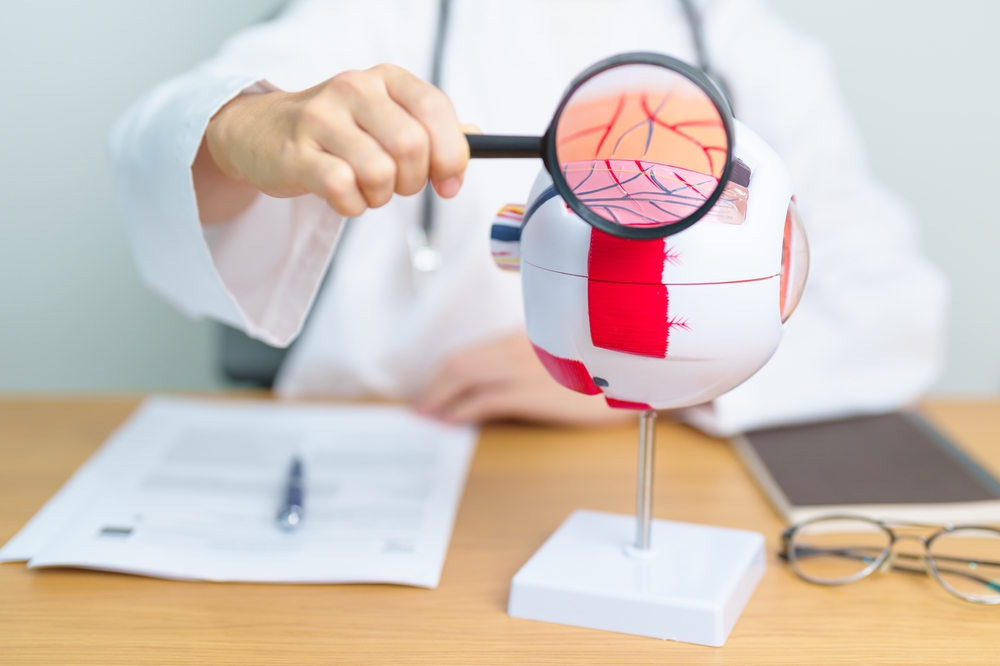Macular degeneration is a common eye condition that blurs the sharp, central vision needed for activities like reading and driving. It happens after age fifty, but catching symptoms like blurry areas near the center of vision early is key to saving your sight.
Though there is no cure, early detection and treatment can significantly slow vision loss associated with macular degeneration. Keep reading to learn more about what macular degeneration is and what the most common symptoms are!
What is Macular Degeneration?
Macular degeneration, which is also known as age-related macular degeneration, is an eye condition that damages the macula. The macula is located at the back of the eye and is a particular part of the retina.
The macula is responsible for central vision and has a high concentration of photoreceptor cells, which detect light. The macula sends the information received by these cells to the brain, which interprets that information as images.

What are the Types of Macular Degeneration?
There are two types of macular degeneration: dry macular degeneration and wet macular degeneration. Dry macular degeneration is the most commonly diagnosed type.
Dry macular degeneration is caused by the build-up of tiny protein deposits, called drusen, under the macula. As these deposits collect, they dry out the cells in the macula, causing them to thin and atrophy.
Dry macular degeneration develops in three stages: early, intermediate, and late. It develops slowly and it can take years for symptoms to become noticeable.
Wet macular degeneration is the less common, but more severe, type of the eye condition. Unlike dry macular degeneration, it develops suddenly and can cause immediate vision impairment.
Wet macular degeneration occurs when abnormal blood vessels develop under the macula. When these abnormal vessels leak, they cause fluid build-up which scars the macula, affecting its shape.
It’s possible for dry macular degeneration to develop into wet macular degeneration in all three stages. Wet macular degeneration is always considered the latest stage of the condition.
What are the Most Common Symptoms of Macular Degeneration?
Because the macula controls central vision, the most obvious symptom of the condition is impaired central vision. However, because macular degeneration develops slowly, the following symptoms may occur before a person’s central vision is affected:
- Difficulty seeing in low-light environments, like a candle-lit restaurant or a room with ambient lighting
- Worsening night vision
- Changes to the quality of visual clarity
- Changes to the perception of colors or a decreased ability to differentiate between like shades of color
- Distorted vision, including seeing straight lines as wavy or bent
- Impairment or loss of central vision
- The sudden appearance of dark spots in the central field of vision

How is Macular Degeneration Diagnosed?
Most often, macular degeneration is first discovered when a person undergoes a routine eye exam. Because of the slow development of the condition, an eye doctor is likely to see physical evidence of macular degeneration before symptoms start to appear.
At a routine eye exam, the tests that detect macular degeneration include the visual acuity test and the dilated ophthalmoscopy exam. The visual acuity test can measure the quality of the central field of vision, while the ophthalmoscopy exam allows an eye doctor to check for the presence of drusen particles.
Who is Mostly Likely to Develop Macular Degeneration?
Because it can affect anyone, it is hard to accurately predict who is most likely to develop macular degeneration. However, there are certain factors that increase a person’s chances of developing the disease, which include:
Age
Macular degeneration primarily develops in people who are over the age of fifty. As part of the aging process, the tissue in the macula naturally thins and sheds photoreceptor cells, increasing the risk of damage to the macula.
Family History
People who have a first-degree relative, like a parent or a sibling, who have been diagnosed with macular degeneration are more likely to develop the disease. It is estimated that fifteen to twenty percent of people with macular degeneration have a family history of the disease.
What Treatments Are Available for Macular Degeneration?

Though research is ongoing, at this time, there is no cure for macular degeneration. Treatments for the disease focus on alleviating symptoms and preventing further vision impairment.
If you are diagnosed with macular degeneration, your eye doctor may suggest the following treatments:
- Low vision aids and rehabilitation
- Retinal injections
- Vision-promoting nutritional supplements
- Laser therapy
- Photodynamic therapy
Because of the serious impact that macular degeneration can have on your vision, especially as you age, it is important to know as much as you can about this common eye disease and its symptoms. Knowing how macular degeneration affects your central field of vision and the most common symptoms of the disease can lead to early diagnosis and more effective treatment outcomes!
If you are noticing changes to your vision as you age, a comprehensive eye exam can help you maintain your clear eyesight. Schedule an appointment at Nevada Eye Physicians in Las Vegas, NV, today!



